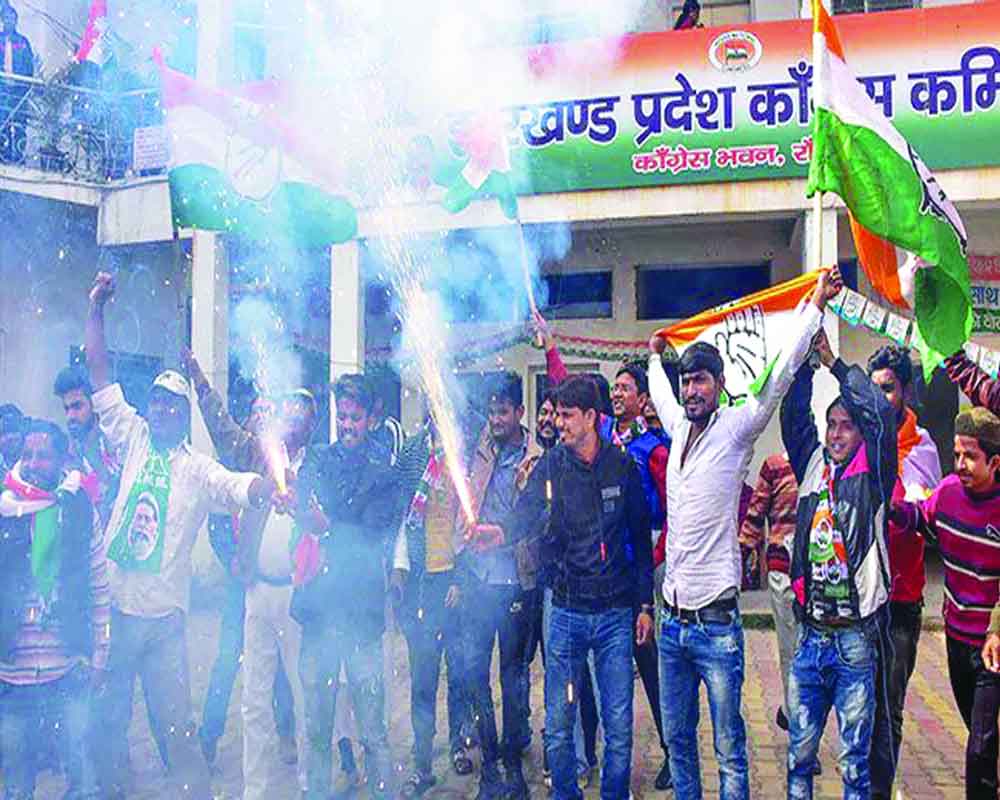Hyper localisation is the only mantra for Assembly elections and national parties should re-orient strategies than just machinery
In the end, the best part of Indian democracy is that it self-corrects runaway ambitions and restores the representative nature of our polity. So the results of the Jharkhand Assembly elections come as no surprise in the sense that they reject a presidential model of governance that the ruling BJP pushes through the magic wand of PM Narendra Modi and remind us why we are a federal union of States. The tribal-dominated State has voted local, showing the BJP, much like Haryana and to some extent, even Maharashtra did, why imposing an outsider as Modi’s acolyte will not work till the party genuinely believes in decentralising regional branches, building local leadership or empowering alliances with parties that have them. That it needs to build its own coalition dharma rather than breaking parties. Clearly, the writ of Shibu Soren and his Jharkhand Mukti Morcha (JMM) runs large, no matter what his history of political bargaining with national parties or corruption scandals might have been. Locals trust him to take care of their concerns, particularly land rights, no matter what and son Hemant has been consistent in his protectionist campaigns, the latest being an attack on the global investors’ summit as a “maha chintan shivir of land grabbers.” He claimed it as sanctifying an organised loot of the land of adivasis, moolvasis and farmers. Though the BJP may now be mending bridges with Sudesh Mahto of the All Jharkhand Students’ Union (AJSU) or Babulal Marandi of the Jharkhand Vikas Morcha (JVM), the fact is it had treated both badly, enough for them to discontinue their partnership with it. The non-tribal consolidation cannot work in a State where 26 seats are completely dominated by tribals. In the end, the BJP had to pay for outgoing Chief Minister Raghubar Das’ bartering of land rights and pushing amendments that diluted tribal ownership and made it easier for the State to transfer land to industrial projects without local consent. For tribals, “jal, jangal aur jameen” will always be key issues where they want stakeholdership and through it their relevance in political power. They do not want displacement, relocation or rehabilitation, no matter how attractively they are packaged. Given a large number of lynching incidents, the divisive plank also misfired for the BJP, particularly when it sought to divide Christian and non-Christian tribals. Even the urban vote, which had tilted towards the BJP last time, has drifted, proving that people are not buying into its jumlabaazi. Considering its mammoth Lok Sabha victory and aggressive posturing on delivering pro-Hindu promises made in its manifesto, the BJP should be worried about a hitback from a rather unorganised Opposition in less than six months, that, too, by island leaderships in States.
While the BJP needs to be rational, the Opposition shouldn’t be exulting either because all its successes are coming from a default systemic setting rather than any active effort. The local Congress — and it needs to be clarified so — has picked up 14 seats against six last time on its own steam. The Central leadership has been totally absent during campaigning and one tends to think that as a benefit than a drawback. If the party indeed wants to stay in the hunt, rather than playing second fiddle to regional parties, then it needs to immediately call for organisational elections instead of putting caveats in the common minimum programme of State Governments. Empower a group of State leaders other than the Gandhis. And if it has to be a Gandhi, let it be Priyanka with a greater understanding of the political pulse, she being the only axis of her party for the protests over new citizenship policies. Or better bow to the greater message, that the Congress can reinvent itself beyond the Gandhis. There is cheer for Rashtriya Janata Dal (RJD) chief Lalu Prasad Yadav, who has picked up one seat and put up a fight in bordering seats with Bihar, a precursor to how he could mount a counter-pressure to the BJP and Nitish Kumar in the Bihar polls. Meanwhile, the new Jharkhand Government has to be on performance mode from day one, as all parties have promised populist and socialist agenda. One wonders where the revenue for all this would come from as the State fares rather poorly on economic indices, particularly on hunger and poverty. The major challenge for the new government will be on handing out doles, which never seem practical for implementation. Primary among them is the reservation of OBCs. The Congress promised 27 per cent reservation from the existing 14 per cent, jobs to at least one person per household and a separate Sarna code (religious code) for tribals. The BJP, too, promised job reservation while the JMM pledged to provide 67 per cent quotas to OBCs, Scheduled Tribes and Scheduled Castes besides government jobs to locals. This hyper-localisation, then, is the way State polls will be fought as that alone has reduced BJP’s federal pie to less than 50 per cent of the country today.


























